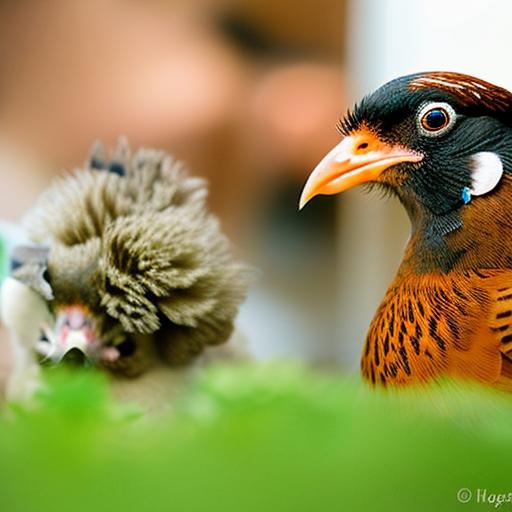In recent years, there has been a growing trend of keeping chickens as indoor pets. What was once primarily a rural activity has now become popular in urban and suburban areas as well. People are discovering the joys of having chickens as companions and the benefits they bring to their lives. However, this trend also comes with its own set of challenges. In this article, we will explore the benefits of keeping chickens as indoor pets, the factors to consider before bringing them indoors, how to choose the right breeds, setting up a safe and comfortable indoor coop, feeding and caring for indoor chickens, health and hygiene considerations, dealing with noise and odor issues, legal considerations, and ultimately help you decide if indoor chicken keeping is right for you.
Key Takeaways
- Indoor chicken keeping is a growing trend among pet owners.
- Keeping chickens indoors can provide benefits such as fresh eggs and companionship.
- Factors to consider before keeping chickens indoors include space, noise, and odor.
- Choosing the right breeds for indoor chicken keeping is important for their health and behavior.
- Setting up a safe and comfortable indoor chicken coop is crucial for their well-being.
Benefits of Keeping Chickens as Indoor Pets
One of the main benefits of keeping chickens as indoor pets is the companionship they provide. Chickens are social animals and can form strong bonds with their human caretakers. They enjoy being around people and can be quite affectionate. Having chickens in your home can bring a sense of joy and happiness to your daily life.
Another benefit of indoor chicken keeping is the entertainment value they offer. Chickens have unique personalities and behaviors that can be fascinating to observe. They are curious creatures that love to explore their surroundings and engage in playful activities. Watching them scratch the ground, take dust baths, or interact with each other can be highly entertaining.
Keeping chickens indoors also provides educational opportunities for both children and adults. Children can learn about responsibility, empathy, and the cycle of life by caring for chickens. They can observe firsthand how eggs are laid and hatched, and learn about the different stages of a chicken’s life. Adults can also benefit from the educational aspect of indoor chicken keeping by learning about sustainable living, self-sufficiency, and animal behavior.
In addition to companionship, entertainment, and education, indoor chickens can also provide fresh eggs and fertilizer. Many people choose to keep chickens for the purpose of having a constant supply of fresh eggs. Chickens that are well-cared for and provided with a balanced diet can lay eggs regularly. The eggs are not only delicious but also free from harmful chemicals and antibiotics. Additionally, chicken manure is a valuable source of organic fertilizer that can be used in gardens to improve soil quality and promote plant growth.
Factors to Consider Before Keeping Chickens Indoors
Before bringing chickens indoors, there are several factors that need to be considered. One of the most important factors is space. Chickens need enough space to move around comfortably and engage in natural behaviors. They should have enough room to stretch their wings, scratch the ground, and perch. It is recommended to have at least 4 square feet of space per chicken indoors.
Another factor to consider is the time commitment required for indoor chicken keeping. Chickens need daily care, including feeding, watering, cleaning, and social interaction. They also require regular health checks and vaccinations to ensure their well-being. It is important to assess whether you have the time and dedication to provide the necessary care for indoor chickens.
Noise and odor issues are also potential challenges of indoor chicken keeping. Chickens can be noisy animals, especially when they are laying eggs or feeling threatened. This can be a concern if you live in an apartment building or have close neighbors. Additionally, chickens produce waste that can have a strong odor if not properly managed. It is important to consider how you will address these potential issues before bringing chickens indoors.
Proper ventilation and lighting are essential for the health and well-being of indoor chickens. Good ventilation helps remove moisture, ammonia, and odors from the coop, while proper lighting ensures that chickens have a natural day-night cycle. It is important to provide adequate ventilation and lighting in the indoor coop to maintain a healthy environment for the chickens.
Choosing the Right Breeds for Indoor Chicken Keeping
When it comes to indoor chicken keeping, not all breeds are well-suited for living indoors. Some breeds are more adaptable to indoor environments and have calm and friendly personalities. These breeds are generally easier to handle and less likely to cause disturbances in the home.
Silkies are a popular breed for indoor chicken keeping due to their calm and friendly nature. They have soft feathers and a unique appearance, which makes them a favorite among chicken enthusiasts. Silkies are also known for being good mothers and can be great companions for children.
Another breed that is well-suited for indoor living is the Bantam. Bantams are smaller in size compared to standard chicken breeds, which makes them more manageable in indoor spaces. They are known for their friendly and docile personalities, making them great pets for families.
If you are looking for chickens that are good egg layers and low-maintenance, consider the Leghorn breed. Leghorns are known for their high egg production and can lay up to 280 eggs per year. They are also relatively low-maintenance and require less space compared to other breeds.
Setting Up a Safe and Comfortable Indoor Chicken Coop
Setting up a safe and comfortable indoor coop is crucial for the well-being of your chickens. The coop should provide adequate space, proper flooring, bedding, nesting boxes, and enrichment activities.
Firstly, the coop should have enough space to accommodate the number of chickens you plan to keep. As mentioned earlier, it is recommended to have at least 4 square feet of space per chicken indoors. This will ensure that they have enough room to move around comfortably.
The flooring of the coop should be easy to clean and provide good traction for the chickens. Avoid using slippery materials that can cause injuries or discomfort. Bedding such as straw or wood shavings can be used to provide a comfortable and absorbent surface for the chickens.
Nesting boxes are essential for chickens to lay their eggs. Each chicken should have its own nesting box, which should be filled with clean bedding material. The nesting boxes should be placed in a quiet and secluded area of the coop to provide privacy for the chickens.
Enrichment activities are important to keep indoor chickens mentally stimulated and prevent boredom. Provide perches, toys, and objects for them to peck at and explore. This will help keep them entertained and reduce the likelihood of destructive behaviors.
Feeding and Caring for Indoor Chickens

Feeding indoor chickens a balanced diet is essential for their health and well-being. They should be provided with a combination of commercial chicken feed, fresh fruits and vegetables, and occasional treats.
Commercial chicken feed is formulated to meet the nutritional needs of chickens. It is available in different forms such as pellets, crumbles, or mash. Choose a feed that is appropriate for the age and breed of your chickens.
Fresh fruits and vegetables can be offered as a supplement to the commercial feed. Chickens enjoy a variety of fruits and vegetables such as apples, carrots, leafy greens, and berries. However, it is important to avoid feeding them toxic foods such as avocado, chocolate, onions, or garlic.
In addition to food, fresh water should be available at all times for indoor chickens. Chickens need access to clean water to stay hydrated and maintain their overall health. Make sure to regularly clean and refill their water containers to prevent contamination.
Regular cleaning and maintenance of the coop are necessary to ensure the health and hygiene of indoor chickens. Remove soiled bedding, clean the coop surfaces, and disinfect the area regularly. This will help prevent the buildup of bacteria or parasites that can cause diseases.
Health and Hygiene Considerations for Indoor Chickens
Keeping indoor chickens healthy requires regular health checks and vaccinations. Chickens are susceptible to various diseases and parasites that can affect their well-being. It is important to monitor their health and seek veterinary care if necessary.
Regular health checks involve observing the chickens for any signs of illness or distress. Look for changes in behavior, appetite, or appearance. Check their feathers, eyes, beak, and feet for any abnormalities. If you notice any signs of illness, consult a veterinarian who specializes in poultry health.
Vaccinations are an important preventive measure to protect indoor chickens from common diseases. Consult with a veterinarian to determine which vaccinations are necessary for your chickens based on their age, breed, and local disease prevalence.
Proper hygiene and sanitation practices are crucial for maintaining the health of indoor chickens. Clean the coop regularly, remove soiled bedding, and disinfect the area to prevent the spread of bacteria or parasites. Wash your hands thoroughly after handling chickens or cleaning their coop to avoid potential contamination.
Dealing with Noise and Odor Issues in Indoor Chicken Keeping
Noise and odor issues can be a concern when keeping chickens indoors. However, there are strategies that can help minimize these issues and create a more pleasant living environment.
Proper ventilation is key to reducing odor in the indoor coop. Good airflow helps remove moisture, ammonia, and odors from the coop. Install windows or vents that can be opened to allow fresh air to circulate. Consider using air filters or air purifiers to further improve air quality.
Regular cleaning and maintenance of the coop are essential for minimizing odor. Remove soiled bedding, clean the coop surfaces, and disinfect the area regularly. This will help prevent the buildup of bacteria or ammonia that can cause strong odors.
Noise can be minimized by choosing breeds that are known for their calm and quiet personalities. Silkies and Bantams are examples of breeds that tend to be less noisy compared to other breeds. Additionally, providing enough space and enrichment activities can help keep chickens entertained and reduce the likelihood of excessive noise.
It is important to be considerate of neighbors and roommates when keeping chickens indoors. Communicate with them about your plans to keep indoor chickens and address any concerns they may have. Be open to finding solutions that work for everyone, such as implementing noise-reducing measures or adjusting the coop location.
Legal Considerations for Keeping Chickens Indoors
Before keeping chickens as indoor pets, it is important to be aware of the legal requirements in your area. Different cities and municipalities have their own zoning laws and regulations regarding chicken keeping.
Check with your local government or zoning department to determine if keeping chickens indoors is allowed in your area. Some areas may have restrictions on the number of chickens you can keep or specific requirements for coop construction.
In addition to zoning laws, it is also important to consider potential noise and odor complaints from neighbors. Even if keeping chickens indoors is allowed in your area, excessive noise or strong odors can still be a cause for concern among neighbors. It is important to be considerate and take measures to minimize these issues.
Is Indoor Chicken Keeping Right for You?
Indoor chicken keeping can be a rewarding and fulfilling experience, but it also comes with its own set of challenges. Before deciding to keep indoor chickens, carefully consider your lifestyle, living situation, and commitment level.
If you are looking for companionship, entertainment, educational opportunities, fresh eggs, and fertilizer, indoor chicken keeping may be a good fit for you. However, it is important to assess whether you have enough space, time, and resources to provide proper care for indoor chickens.
Remember to choose breeds that are well-suited for indoor living, set up a safe and comfortable coop, provide a balanced diet and regular care, maintain good hygiene practices, address noise and odor issues, and comply with legal requirements.
If you are unsure about whether indoor chicken keeping is right for you, there are resources available to provide further information and support. Local poultry clubs, online forums, and books on chicken keeping can offer valuable insights and guidance.
Ultimately, the decision to keep indoor chickens should be based on careful consideration of your own circumstances and a genuine desire to provide a loving and nurturing home for these unique creatures.
If you’re considering keeping chickens as indoor pets, you may also be interested in learning how to care for goslings. Poultry Wizard has a helpful article on breeding geese and providing proper care for goslings. Understanding the basics of raising goslings can provide valuable insights into the overall care and well-being of poultry. To read more about this topic, check out their article on how to care for goslings. Additionally, if you’re looking for ideas on creating a comfortable living space for your chickens, Poultry Wizard offers a guide on building a farmhouse chicken coop. For those who want to add some charm to their chicken coop, they also have an article on creating a chicken coop country diner.
FAQs
What are the benefits of keeping chickens as indoor pets?
Keeping chickens as indoor pets can provide companionship, entertainment, and fresh eggs. They can also help reduce stress and anxiety levels.
Is it legal to keep chickens as indoor pets?
The legality of keeping chickens as indoor pets varies depending on the location. It is important to check with local laws and regulations before keeping chickens as indoor pets.
What are the challenges of keeping chickens as indoor pets?
Keeping chickens as indoor pets can be challenging due to their natural behaviors such as scratching, pecking, and dust bathing. They also require a lot of space, proper ventilation, and a clean environment.
What kind of space do indoor chickens need?
Indoor chickens need a spacious and well-ventilated area to move around freely. They also need a nesting box for laying eggs and a roosting area for sleeping.
What do indoor chickens eat?
Indoor chickens require a balanced diet of chicken feed, fresh fruits and vegetables, and clean water. It is important to avoid feeding them foods that are toxic to chickens such as chocolate, avocado, and caffeine.
Do indoor chickens need to be vaccinated?
Indoor chickens may still need to be vaccinated against common diseases such as Marek’s disease and Newcastle disease. It is important to consult with a veterinarian to determine the appropriate vaccination schedule for indoor chickens.
What are some tips for keeping indoor chickens healthy?
Some tips for keeping indoor chickens healthy include providing a clean and well-ventilated environment, feeding them a balanced diet, providing fresh water, and monitoring their behavior for any signs of illness. It is also important to practice good hygiene when handling chickens to prevent the spread of disease.
Meet Walter, the feathered-friend fanatic of Florida! Nestled in the sunshine state, Walter struts through life with his feathered companions, clucking his way to happiness. With a coop that’s fancier than a five-star hotel, he’s the Don Juan of the chicken world. When he’s not teaching his hens to do the cha-cha, you’ll find him in a heated debate with his prized rooster, Sir Clucks-a-Lot. Walter’s poultry passion is no yolk; he’s the sunny-side-up guy you never knew you needed in your flock of friends!







